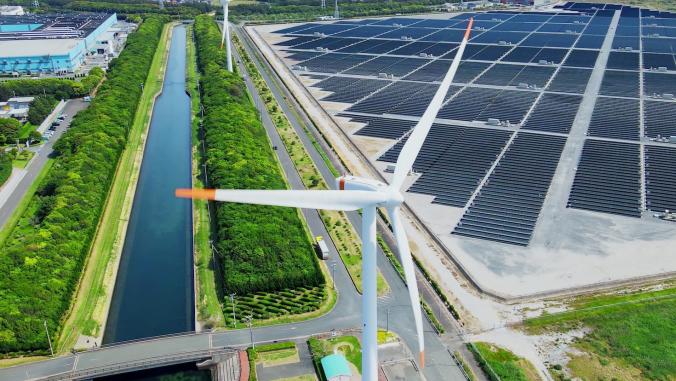Is the finance sector really equipped to assess climate risks?
It's 10 years after the sub-prime mortgage crisis and analysts are still largely ignoring long-term financial risks.

A common complaint among green businesses is that gaining access to long-term financial support for their low carbon products and services can be a struggle, with the blame often leveled at short-term thinking in financial sectors more interested in quick-bucks from hegemonic fossil fuel companies than, say, revising their strategies to account for the disruption caused by the low-carbon industrial revolution.
Yet it is sometimes easy to forget amid all the banker-bashing over the past decade that investors, asset managers and financial analysts are often just as overworked and in thrall to systemic industry pressures as the rest of us, with sometimes scant resources for assessing and planning for risks that may or may not lie beyond the horizon.
Nevertheless, the problem exists all the same, so how best to tackle it?
Various actors are coming at the issue from a number of angles. At one end of the spectrum, campaigners are lobbying for fossil fuel divestment and for oil and gas firms to better disclose how they assess climate risks faced by their own businesses. At the other end, the Financial Stability Board's (FSB) Taskforce on Climate-Related Financial Disclosures is undertaking crucial work to develop voluntary, climate risk disclosures for use by companies in providing better information to investors, lenders, insurers and other stakeholders.
A survey of equity analysts found 74 percent of risk forecasts fall within three years and 94 percent within five.
Meanwhile, two recent joint reports by the 2° Investing Initiative think tank and non-profit sustainable capitalism organization The Generation Foundation have sought to delve more deeply into exactly how much, and why, the global finance sector is failing to sufficiently account for future climate and low carbon economy transition risks — and to plan investments accordingly.
Part of the so-called Tragedy of the Horizon program aims at exploring the finance sector's short-term risk assessment frameworks. The first report — titled "All Swans Are Black in the Dark (PDF)" in reference to the Black Swan phenomenon whereby financial assumptions can be exploded by a single shock event — warns that even 10 years after the sub-prime mortgage crisis that triggered a global financial crash, analysts are still largely ignoring long-term financial risks, such as those from climate change, the energy transition and disruptive low carbon technologies.
According to the research findings, equity research analysts and credit ratings agencies still tend to focus three to five years ahead and overlook risks to the long-term viability of companies. It adds that a lack of demand from the investment community for long-term research is in part to blame.
Specifically, a survey of equity analysts found 74 percent of risk forecasts fall within three years and 94 percent within five — yet unconventional risks to carbon-intensive sectors from the low carbon energy transition are often likely to be felt over a longer time frame.
Presenting the findings Friday in London, Mona Naqvi, co-author of the report and program manager for the 2° Investing Initiative, warned that unless assets are priced accurately in line with longer term risks and opportunities, investors could suffer unexpected losses and stock market bubbles could form, which could impose huge costs on society when they burst, as well as dent some companies' reputations. "Short-term analysis may also miss business opportunities and lead to underinvestment in sectors that can benefit society," she added.
One of the more obvious recent examples cited by the report of analysts and investors failing to spot clear risks — or finding themselves in the dark over forthcoming "white swans" — is the Volkswagen emissions scandal. Indeed, there were signs of trouble long before the issue was brought to worldwide attention in 2015 when the U.S. Environmental Protection Agency fined the German carmaker, which saw its stock market value subsequently plummet.
In contrast, on the opportunity side of the equation, U.S. car equipment manufacturer Tenneco actually has benefitted significantly from tighter emissions standards and regulations, which have led to an upgrade in its credit rating in recent years.
Naqvi therefore believes there is a need for more transparency over how companies are analyzed, as well as more innovation within the financial sector to better understand the type of systemic risks that can lead to market crashes.
"The models that we have today are not well equipped to deal with the long term and they require innovation," she said, adding, however, that such innovation requires investment. "It is very expensive and costly as it can take a lot of time to invest in understanding the future, particularly as it is very uncertain. And of course, against the backdrop of declining budgets, it is becoming increasingly difficult."
Investment portfolio turnover is still too high to properly support low carbon opportunities.
Part of the problem for the low carbon economy, too, is that long-term-only equity investment managers are also turning over their portfolios — or buying and selling on their investments — too frequently, according to the Tragedy of the Horizon project's second "sister" report, "The Long and Winding Road (PDF)."
Although most asset owners analyzed in the report, such as pension funds and insurers, have long-term liabilities of 20 years or more, those managing these assets are far more short-term in their thinking, turning over these portfolios every 21 months on average. Indeed, the report found, almost 90 percent of institutional equity funds are turning over their portfolios after less than three years, even though the research suggested longer-term holding periods and investments benefitted financial performance.
"This is illustrative more than conclusive and I wouldn't want to draw any firm conclusion," said report co-author Rich Dell, global equities manager at Mercer. "But we do think that having an optimum turnover beyond 1.7 years — maybe close to four years — might be something that investors would want to consider and have in the back of their minds."
The two reports raise serious, systemic issues with regards to the global finance sector's ability to foresee climate risks and opportunities, and to think longer-term about investment strategies. But they also highlight reasons for optimism as far as the green economy is concerned.
The work being done by the FSB's Taskforce, and indeed that of the Tragedy of the Horizon project, shows that financial regulators are starting to address the lack of analysis of climate risk, suggesting they recognize the dangers of mispricing and the potential for stranded assets.
The second report found that while investment portfolio turnover is still too high to properly support low carbon opportunities, the trend in turnover frequency is also definitely downward — perhaps at odds with perceived wisdom that there is increasing short-termism in financial markets.
In other words, asset management and risk analysis certainly seem to be heading in a greener direction — but how widespread the recognition is needed for a change in thinking across the finance sector. And how quickly that change happens is another matter.
"I think it is moving in the right direction; the question is how quickly it is going to move in the right direction," Mike Wilkins, managing director at S&P Global Ratings, told BusinessGreen. "And that's why there are things being set up to try and accelerate the transition. The work the FSB Taskforce is doing is absolutely fundamental to not just change the mindset, but to hardcode financial disclosure requirements into the framework so that every participant in the financial system can get a much more informed and consistently comparable view of what these risks and opportunities are."
Accelerating that work through the FSB Taskforce is crucial in order to quicken the pace of the low carbon transition, because simply leaving it to market forces will leave it too late, according to Wilkins.
"Yes, financial risk, disclosure and long-term thinking is improving and investors are asking the right questions, but it is probably not improving quickly enough to avert the dangers that are lurking around the corner," he added.
The Tragedy of the Horizon project plans to publish further data and best practice guidance for finance sectors based on its findings so far, while the FSB Taskforce is set to publish its final recommendations during the first quarter of 2018. For green businesses, the wider adoption of the investment best practices they propose cannot come soon enough.
This story first appeared on:





